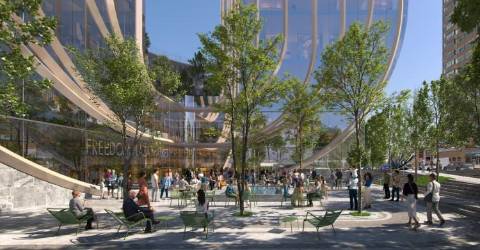The Quest for a Manhattan Casino
Michael Hershman describes Manhattan as “the Holy Grail” for establishing one of the new downstate casinos that voters and lawmakers approved years ago. He states, “If the goal is generating tax revenue, a casino in Manhattan is essential due to its tourism appeal.” Hershman emphasizes that a significant portion of tourism dollars flow into Manhattan, unlike other boroughs such as Queens, the Bronx, and Brooklyn, which diminishes their potential for revenue generation.
Proposals and Competition
As CEO of Soloviev Group, Hershman is an interested party, presenting one of the final proposals for a Manhattan casino, with plans for an $11 billion “Freedom Plaza” to be situated on currently vacant land near the United Nations. He plans to submit the $1 million application fee by the June 27 deadline, although a contentious debate is emerging around whether a Manhattan casino should indeed be awarded a license, especially his.
Political Pushback
Senator Brad Hoylman-Sigal has openly opposed the idea of a casino in Manhattan, stating through his campaign materials, “If you want a Manhattan casino, don’t vote for me.” His challenger, Council Member Keith Powers, points out the inconsistency, noting that Hoylman-Sigal previously voted to authorize the three licenses he’s now against granting in Manhattan. “It’s the typical Albany maneuver,” Powers remarked during a debate.
Broader Perspectives
Hoylman-Sigal maintains that his previous vote does not indicate approval for a Manhattan location. Meanwhile, proposals are also coming from outside the borough, including expansions from racetracks in Westchester and Queens, alongside a project near CitiField. Various plans are also emerging from the Bronx and Brooklyn.
Community Influence
The debate between Powers and Hoylman-Sigal will significantly impact where the new casinos are located. Hoylman-Sigal notes that communities have substantial power in the decision-making process, thanks to Community Advisory Councils comprised of elected officials, who can effectively veto proposals. Hershman and other Manhattan developers attribute past failures to political resistance, claiming that their chances are now better following the collapse of a Hudson Yards plan.
Enticing the Community
To strengthen their proposals, contenders are rolling out attractive benefits. Hershman emphasizes that the Freedom Plaza will not only feature a casino but also a 4.5-acre park, a museum, and over 1,000 housing units, nearly half of which would be affordable. He promises that 2% of net profits will be returned to the community, potentially totaling $200 to $250 million over 20 years.
The Future of the Decision
The timing of the community advisory councils’ meetings post-submission is uncertain, although the state aims to finalize license awards by the year’s end. Delays could impact the makeup of these councils, possibly introducing a new Borough President who may oppose a Manhattan casino. Activist Marisa Redanty argues that Manhattan must adapt to the reality created by voters and lawmakers rather than resisting it, indicating a preference for the SL Green plan in Times Square due to its potential benefits regarding security and crime reduction.



